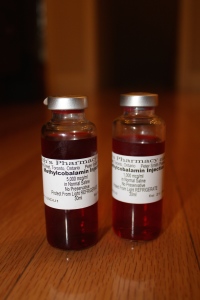 One of my favourite vitamins, after B6, is vitamin B12! (Magnesium is my fav mineral). I have recently bought 1000 mcg and 5000 mcg bottles of injectable methylcobalamin for my clinic. The vitamin contains no preservatives or additives. $15 gets you a quick burst of energy in your deltoid muscle.
One of my favourite vitamins, after B6, is vitamin B12! (Magnesium is my fav mineral). I have recently bought 1000 mcg and 5000 mcg bottles of injectable methylcobalamin for my clinic. The vitamin contains no preservatives or additives. $15 gets you a quick burst of energy in your deltoid muscle.
Here are 12 things you should know about this snazzy, red vitamin.
1) Vitamin B12 is a water soluble B vitamin. It is excreted through the kidneys.
2) It is found naturally in animal products (meat, eggs, fish, dairy). Vegans do not get this from their diets and need to supplement.
3) Excess amounts of B12 are stored in the liver for up to 10 years.
4) B12 deficiency can result in neurological symptoms such as neuropathy: numbness and tingling, depression, dizziness, anemia and fatigue. Suboptimal levels can result in fatigue.
5) B12 absorption can be impaired in the elderly, those who have had gastrointestinal surgery and those with low stomach acid. It requires intrinsic factor, excreted in the stomach to be absorbed in the intestine.
6) B12 is cobalamin. Supplements of B12 come in three main forms: cyanocobalamin, hydroxycobalamin and methylcobalamin.
7) Methylcobalamin is the active form of B12, which is easily absorbed and passes the blood brain barrier, making it an effective treatment for depression and mental fatigue. Cyanocobalamin must be converted to hydroxycobalamin, which is then converted to methylcobalamin. Many people have inadequate enzymes to convert cyano and hydroxycobalamin to the active form. Therefore, supplementing with methylcobalamin is the best option. It also helps support methylation, which our bodies need for detoxification and mental functioning, among a myriad of other biological pathways. Getting a dose of methylcobalamin is like a 2-for-1 deal: you get a bioavailable form of vitamin B12 AND a methyl donor. Who wouldn’t want to get in on that?
8) B12 levels of under about 200 umols/L of blood is termed a B12 deficiency, where neurological symptoms begin to appear. However, for health, naturopathic doctors prefer B12 levels to be at least above 600 umols/L of blood, ideally 1000. Symptoms are often used as the primary guiding force for B12 supplementation. Some genetic variations result in impaired absorption of B12, resulting in high blood levels, but low levels available to cells. Therefore, testing serum B12 is not a very reliable marker of B12 status in the body. Other markers such as homocysteine and methlymalonic acid can help tell more of the story, or you can choose to supplement and listen to your body, seeing how B12 injections make you feel. B12 is non-toxic and there is no known upper limit.
9) Injections of B12 can be used to treat depression, obesity, weight gain, fatigue, fibromyalgia, autoimmune disease, multiple sclerosis and dementia among other conditions. In most people, B12 injections provide a welcome energy boost. A series of shots of 5000 mcg of methylcobalamin is a powerful treatment for depression; B12 helps the body make serotonin, the happy neurotransmitter.
10) People taking Metformin (a glucose-lowering medication for type II diabetes) should supplement with B12 as this medication depletes the vitamin.
11) Vitamin B12 is required to make red blood cells. Deficiency can cause anemia.
12) B12 also keeps homocysteine low. High homocysteine is an independent risk factor for heart disease and can cause inflammation in the body.
Contact me to learn more about getting B12 injections and injecting some energy into your holiday season!







What do you think about sublingual B12? Is it a better option for people unable to get the injections?
Hi, Joy! Good question. Sublingual is a good option and some supplements are better than others. It is not as well-absorbed as injections, and some people have the inability to absorb it, as it still requires some to be absorbed in the intestine. The dosing differs as well.